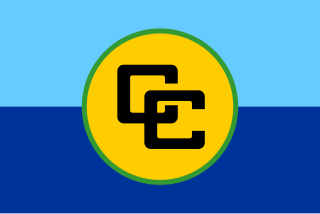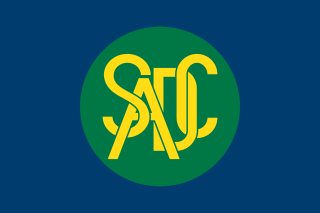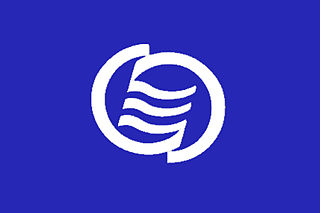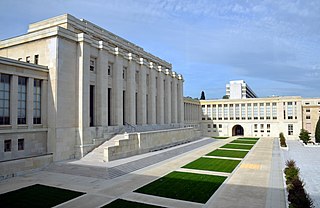Related Research Articles

Since independence, with Jaja Wachuku as the first Minister for Foreign Affairs and Commonwealth Relations, later called External Affairs, Nigerian foreign policy has been characterised by a focus on Africa as a regional power and by attachment to several fundamental principles: African unity and independence; capability to exercise hegemonic influence in the region: peaceful settlement of disputes; non-alignment and non-intentional interference in the internal affairs of other nations; and regional economic cooperation and development. In carrying out these principles, Nigeria participates in the African Union, the Economic Community of West African States (ECOWAS), the Non-Aligned Movement, the Commonwealth of Nations, and the United Nations.

The United Nations Economic and Social Council is one of the six principal organs of the United Nations, responsible for coordinating the economic and social fields of the organization, specifically in regards to the fifteen specialised agencies, the eight functional commissions, and the five regional commissions under its jurisdiction.

The Economic Community of West African States is a regional political and economic union of fifteen countries located in West Africa. Collectively, these countries comprise an area of 5,114,162 km2 (1,974,589 sq mi), and in 2015 had an estimated population of over 349 million.

The Caribbean Community is an intergovernmental organization that is a political and economic union of 15 member states throughout the Caribbean. They have primary objectives to promote economic integration and cooperation among its members, ensure that the benefits of integration are equitably shared, and coordinate foreign policy. The organization was established in 1973 with its four founding members signing the Treaty of Chaguaramas. Its primary activities involve:

The Shanghai Cooperation Organisation (SCO) is a Eurasian political, economic and security organization. It is the world's largest regional organization in terms of geographic scope and population, covering approximately 60% of the area of Eurasia, 40% of the world population, and more than 30% of global GDP.

The Pacific Community (PC), formerly the South Pacific Commission (SPC), is an international development organisation governed by 27 members, including 22 Pacific island countries and territories. The organisation's headquarters are in Nouméa, New Caledonia, and it has regional offices in Suva, Pohnpei, and Port Vila, as well as field staff in other locations in the Pacific. Its working languages are English and French. It primarily provides technical and scientific advice, and acts as a conduit for funding of development projects from donor nations. Unlike the slightly smaller Pacific Islands Forum, the SPC is not a trade bloc, and does not deal with military or security issues.

The Southern African Development Community (SADC) is an inter-governmental organization headquartered in Gaborone, Botswana.

The Economic Cooperation Organization or ECO is an Asian political and economic intergovernmental organization that was founded in 1985 in Tehran by the leaders of Iran, Pakistan, and Turkey. It provides a platform to discuss ways to improve development and promote trade and investment opportunities. The ECO is an ad hoc organisation under the United Nations Charter. The objective is to establish a single market for goods and services, much like the European Union. After the dissolution of the Soviet Union, the ECO expanded to include Afghanistan, Azerbaijan, Kazakhstan, Kyrgyzstan, Tajikistan, Turkmenistan, and Uzbekistan in 1992.

The Association of Caribbean States is an advisory association of nations centered on the Caribbean Basin. It was formed with the aim of promoting consultation, cooperation, and concerted action among all the countries of the Caribbean coastal area. The primary purpose of the ACS is to promote greater trade between the nations, enhance transportation, develop sustainable tourism, and facilitate greater and more effective responses to local natural disasters.

The Economic Community of Central African States is an Economic Community of the African Union for promotion of regional economic co-operation in Central Africa. It "aims to achieve collective autonomy, raise the standard of living of its populations and maintain economic stability through harmonious cooperation".

The Technical Centre for Agricultural and Rural Cooperation ACP-EU (CTA) was established in 1983 under the Lomé Convention between the African, Caribbean and Pacific Group of States and EU member states. Since 2000 CTA has operated within the framework of the ACP-EU Cotonou Agreement with a mission to “strengthen policy and institutional capacity development and information and communication management capacities of ACP agricultural and rural development organisations. It assists such organisations in formulating and implementing policies and programmes to reduce poverty, promote sustainable food security, preserve the natural resource base and thus contribute to building self-reliance in ACP rural and agricultural development.”. The centre is closed in 2020, after the end of the Cotonou Agreement and the subsequent end of its financing.
Divers Alert Network (DAN) is a group of not-for-profit organizations dedicated to improving diving safety for all divers. It was founded in Durham, North Carolina, United States, in 1980 at Duke University providing 24/7 telephonic hot-line diving medical assistance. Since then the organization has expanded globally and now has independent regional organizations in North America, Europe, Japan, Asia-Pacific and Southern Africa.

An international organization or international organisation, also known as an intergovernmental organization or an international institution, is a stable set of norms and rules meant to govern the behavior of states and other actors in the international system. Organizations may be established by a treaty or be an instrument governed by international law and possessing its own legal personality, such as the United Nations, the World Health Organization and NATO. International organizations are composed of primarily member states, but may also include other entities, such as other international organizations, firms, and nongovernmental organizations. Additionally, entities may hold observer status.

Self Help Africa is an international charity that promotes and implements long-term rural development projects in Africa. Self Help Africa merged with Gorta in July 2014, and the group of companies operates under the Self Help name.
South–South cooperation (SSC) is a term historically used by policymakers and academics to describe the exchange of resources, technology, and knowledge between developing countries, also known as countries of the Global South. The Global South is making increasingly significant contributions to global development. The economic and geopolitical relevance of many countries has grown. In the past, south-south cooperation focused on sharing knowledge and building capacities, but the countries of the Global South and new financial institutions have recently also become increasingly active in development finance.

The Union for the Mediterranean is an intergovernmental organization of 43 member states from Europe and the Mediterranean Basin: the 27 EU member states and 16 Mediterranean partner countries from North Africa, Western Asia and Southern Europe. It was founded on 13 July 2008 at the Paris Summit for the Mediterranean, with an aim of reinforcing the Euro-Mediterranean Partnership (Euromed) that was set up in 1995 as the Barcelona Process. Its general secretariat is located in Barcelona, Spain.
The Regional Strategic Analysis and Knowledge Support System (ReSAKSS) was established in 2006 and compiles and analyzes information to help design and evaluate rural development strategies and monitor the progress of the Comprehensive Africa Agriculture Development Programme (CAADP). CAADP is a program of the African Union and the New Partnership for Africa's Development (NEPAD), which aims to increase the share of national budgets allocated to agriculture.
The Pacific Island Farmers Organisation Network (PIFON) serves as an umbrella organisation for national farmer organizations in the Pacific island region. It is based in Nadi, Fiji and has membership of organisations from the Cook Islands, Fiji, Tonga, Samoa, Solomon Islands and Vanuatu, as well as a Melanesian regional organisation. Although operating informally since 2009, its first formal foundation meeting was held in April 2013 in Nadi, when 13 organisations were represented and PIFON became operational as a legal entity in its own right.
References
- ↑ "SACAU Profile". FANRPAN. Retrieved 13 February 2016.
- 1 2 "Our members". SACAU. Retrieved 13 February 2016.
- ↑ "Our objectives". SACAU. Retrieved 13 February 2016.
- ↑ "Development partners". SACAU. Retrieved 13 February 2016.